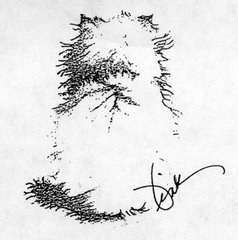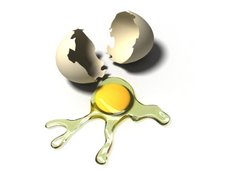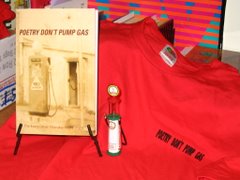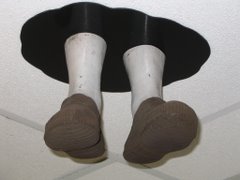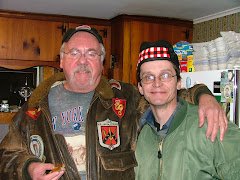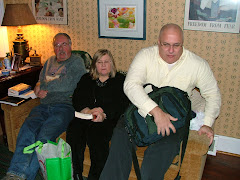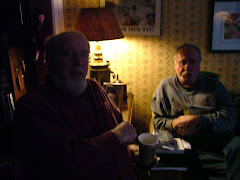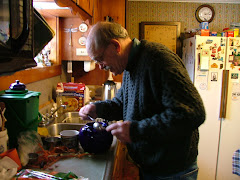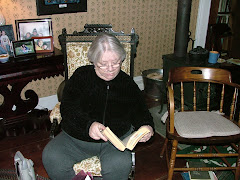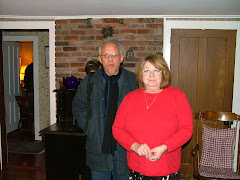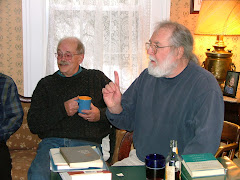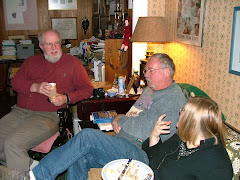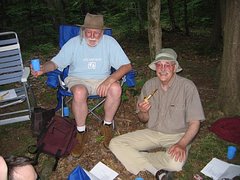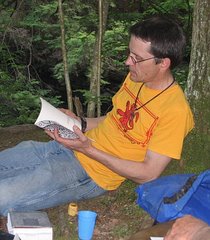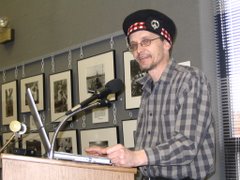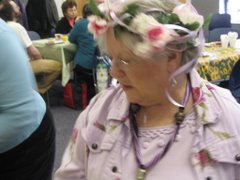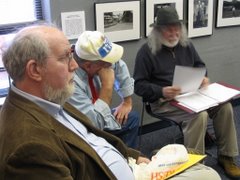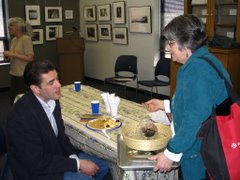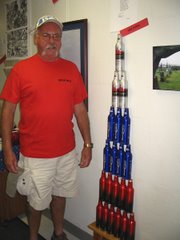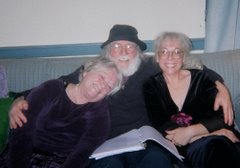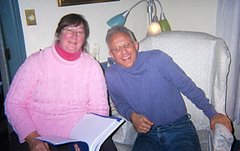The two Moriartys were the opening acts last night. Philomena wrote I only know exceptional people, the title being a line from a conversation with her husband. Suggestion: revise to 3-line stanzas. We all like the cast-iron skillet. Mimi was on point, both with her own poem Crying Baby and with her critiques. There were different interpretations of the meaning of "crimson age". Everybody agreed about the effectiveness of "Crap." Standing tall and proud.
Obeedude produced one of his finest, reflecting on lost childhood, complete with an elementary school photo of himself as a blond (!) necktied sweetie. "...was your life left at the bottom of a shoebox filled with Kodachrome and light?" Aren't we all there?
What is a poem? Benevolent Bird inspired yet more talk about what poetry is with Tyman Bouwensen, Dutch Soldier 1626 - an historical piece about the hostilities between the Dutch and the two indian tribes near Fort Amsterdam. Tim V. kicked off the discussion by pointing our that the "poem" read like a news release, with an aura of detachment between the event and author. Mark said it had no beautiful language and Mimi said the clunky lines needed air.
Bird's style to me (and I am only speaking for myself here) usually presents more as a science or history lecture than a poem. Very factual, very straightforward. Very prose. Leaving me with this question - if a writer presents something as a poem, should we just accept it as a poem even if we don't think it is? I dunno. How can anyone offer helpful commentary when they are coming from such opposing viewpoints? I guess I can't. The consensus seemed to be that this Dutch piece was a good story, but had no music to it that would make it poetic. Mimi's final suggestion was to make it a ballad with a refrain. There's an idea.
Alan sometimes has great rushes of inspired writing. I have a snippet from one of his poems tacked on my bulletin board. "...I imagined I was a poet writing you a poem made of wind when I'm the wind." That touched me. That's poetry.
Two, not one, but two, newcomers sat through and contributed to our brutal observations. Timothy Lake and Jim Williams joined us, both bravely bringing a poem to share. We now have a Tim, Tim and Jim, if we haven't frightened the new guys away.
TL picked a wonderful subject for his work - the demolition of an old house. It made me want to write about the same thing, which is always good. He had one phrase that I loved: "ample space for urban ghosts". The advice we gave was that he clean it up, take out unneccessary adjectives and substitute more descriptive words for less specific ones such as "part" and "form".
Jim got a resounding thumbs up for Arrivals---Departures, a terse two column snapshot of a middle-aged couple at an airport,
bags weighing them
d
o
w
n.
Looked like he knew what he was doing.
More visual aids from Tim V. (hey, we could have a TeeVee and a TeeEll). Tim brought photos he had taken of a mystery 17th century cemetery he found on his travels. It was accompanied by a rather haunting poem, for which only minor suggestions for change were offered. I am a fan of old cemeteries and was particularly intrigued.
Another winner from Mister Willis, brief snapshots of an American high school girl and an elderly Russian peasant woman. Either stanza could have been a complete poem in itself, but meshed admirably through the idea of men being jerks. (Art said that, not me!)
Paul produced another flawless effort about a small boy and a lost coin, which Mimi observed was "wonderful before we started messing with it".
I did have a poem, about Eli and I visiting a house where no one answered the door. I thought my best line was the dog "yellowing the snow with impatience". Art pronounced it the "prologue to a novella".
I actually think that we are becoming quite adept at our critiques, and I am becoming an advocate of not pussyfooting around with our comments. (See New Year's Resolution.)
On to business: brunch date is Saturday, April 25, I'll go over details when it gets closer.
Remember the June art show! Bring your pieces to the regular meeting on May 28 and we will hang the show that night or the next day. Anything goes as long as you excercise reasonably good taste. Sculpture, collage, found art, painting or drawings (must be framed for hanging). Outre is in - evidence Mark's shoes descending from the hall ceiling. I just had an epiphany - how about a tromphe l'oeil in the hallway? We'll talk...
Here we are...
...a group of Baby Boomers of sundry religious,
political and cultural orientations, who have been
meeting at the Voorheesville Public Library since 1991
to read and discuss each other's poems.
We include old fathers and young grandmothers,
artists and musicians, and run-of-the-mill eccentrics.
Writers are welcome to stop in and stay if they like us.
political and cultural orientations, who have been
meeting at the Voorheesville Public Library since 1991
to read and discuss each other's poems.
We include old fathers and young grandmothers,
artists and musicians, and run-of-the-mill eccentrics.
Writers are welcome to stop in and stay if they like us.
Some of Us

Dennis Sullivan, Beverly Osborne, Tom Corrado, Edie Abrams, Art Willis, Alan Casline (all seated); Paul Amidon, Mike Burke, Tim Verhaegen, Mark O'Brien, Barbara Vink, Philomena Moriarty
Friday, February 27, 2009
Wednesday, February 18, 2009
Jay Rogoff
...is the featured poet at Sunday Four this week (22nd). I worked with Jay in the early '90s when I was Charlie Rossiter's assistant with the Poets In Person grant. Should be a good show and I hope a good turnout. Sorry that I will be in NYC and will miss it.
Friday, February 13, 2009
Barbara's Dress Test
I flunked the dress test and it gave me a wicked headache. So, I settled for a pair of jeans at Macy's which was having great sales, btw. Here's is last night's blog by our ghost blogger, although I guess he can't be a ghost blogger if we can see him. Anyway, it's Paul, who leapt in first thing with his offer of a recap. Thanks, Paul. Dennis also had comments this a.m. which I wish he would publish on the blog instead of emailing, but he never does.
THE MECHANICS OF POETRY
An annoying wind was at work Thursday night, pestering the trees, making short work of the few leaves that had gotten loose from the frozen ground during the day. On the road to Voorheesville, only homeward-bound commuters, a few poets. The workshop crew was assembling, the mechanics of poetry preparing to turn the wrenches, tighten the screws.
Alan’s “Want the Warrior Not the Wound,” a poem by turns graceful images and cryptic references, came with a short Italian phrase as an aside that launched a discussion about the use of foreign languages in poems written for English-speaking audiences. The discussion trailed off without reaching a conclusion; maybe there is no conclusion, poets being what they are.
Dennis, no stranger to foreign languages, had nothing but English in his “Early Morning Psalm,” a meditative work that achieved its high point in the poetic humility of the fourth verse. The poem demonstrates how far religious ideas in the proper hands can rise above the preach religious rubbish that writers long on zeal and short on talent routinely produce.
Newcomer Rachael Ikins gave us “The Flea Market,” a title that didn’t seem to fit, probably because it conjures an image different from the place the poem took us. As Alan pointed out, the poem goes in a different direction from the one we expected. All the same, “mirrors collecting dusty faces” is the kind of line poetry is all about.
Philomena’s “Settling,” described by Alan as “Robert Creeley-like in its simplicity,” somehow managed to start a discussion that gave gerunds quite a beating. Various meetings of this group have witnessed the maligning of adjectives and adverbs; last night gerunds got worked over. If people start trashing nouns and verbs, we could end up walking around with targets on our backs, the word “poet” written in the bulls-eye.
Mark arrived with “And Rue, Sweet Rue, For You,” a three and a half page ballad skillfully written in Ulster-Scot dialect. I personally need more time than is provided by one reading to assimilate a poem of this type and length. On the first reading, intent and meaning become secondary to understanding the language. Tim felt it would be better sung than spoken, and Mark’s notation that it is a ballad gives weight to this idea. Mimi wants it performed at the April Poetry Brunch – from memory. Ten weeks, Mark. How about it?
Mimi’s “Diner” was a wonderful collage of images and musings that did justice to the uniquely American eatery known as a diner. As discussion of this poem moved along, ideas fed on each other to create new ideas in a chain reaction that gave the poet so much input there’s no telling how this piece will look in revised form. Good, that’s how it will look, but in what way?
“Group Think,” by Tim, is two poems in one, or maybe it isn’t. Depends on who you ask. The scenario of the chased woman is one part, the observations are another. The pithy and insightful “observations” verses, part rant, part humor, pack a lot of food for thought in their lines. I thought they were great; they spared no one.
Poem of the night (if anyone should ask me) was Ron Pavoldi’s “Boilermaker.” Strong graphic imagery from start to finish succeeds in giving the listener or reader a powerful portrait of hard-drinking men leading dead-end lives as workers in a varnish manufacturing plant, stuck in jobs that kill them faster than their alcoholism does. This poem does not leave its audience wondering what it is trying to say. Its impact comes from leaving little doubt about what it is saying.
Edie’s well-titled “A Walk In the Park” did indeed take us for a walk in the park, but not in the way the most common use of the phrase (meaning something is easy) would suggest. Used in its literal sense, it fit a poem that centers on two people walking in a park held firmly in the grip of winter. Its descriptive quality, as Alan noted, “captures the natural world.” Mimi voiced a creative idea that would leave it as good or better by contracting each stanza by one line, one of those ideas that often gets the subconscious coming back for another look.
Cathy Anderson finally came back, and presented a timely poem called “Valentine.” It is a fine illustration of the truism that there is poetry in everyday things and everyday occurrences. The whole piece is a scene, a memory, given to us as a picture painted with details, made warmer still with a touching last verse. Quite effective.
Next meeting is February 26. Write what you think. Bring what you dare.
THE MECHANICS OF POETRY
An annoying wind was at work Thursday night, pestering the trees, making short work of the few leaves that had gotten loose from the frozen ground during the day. On the road to Voorheesville, only homeward-bound commuters, a few poets. The workshop crew was assembling, the mechanics of poetry preparing to turn the wrenches, tighten the screws.
Alan’s “Want the Warrior Not the Wound,” a poem by turns graceful images and cryptic references, came with a short Italian phrase as an aside that launched a discussion about the use of foreign languages in poems written for English-speaking audiences. The discussion trailed off without reaching a conclusion; maybe there is no conclusion, poets being what they are.
Dennis, no stranger to foreign languages, had nothing but English in his “Early Morning Psalm,” a meditative work that achieved its high point in the poetic humility of the fourth verse. The poem demonstrates how far religious ideas in the proper hands can rise above the preach religious rubbish that writers long on zeal and short on talent routinely produce.
Newcomer Rachael Ikins gave us “The Flea Market,” a title that didn’t seem to fit, probably because it conjures an image different from the place the poem took us. As Alan pointed out, the poem goes in a different direction from the one we expected. All the same, “mirrors collecting dusty faces” is the kind of line poetry is all about.
Philomena’s “Settling,” described by Alan as “Robert Creeley-like in its simplicity,” somehow managed to start a discussion that gave gerunds quite a beating. Various meetings of this group have witnessed the maligning of adjectives and adverbs; last night gerunds got worked over. If people start trashing nouns and verbs, we could end up walking around with targets on our backs, the word “poet” written in the bulls-eye.
Mark arrived with “And Rue, Sweet Rue, For You,” a three and a half page ballad skillfully written in Ulster-Scot dialect. I personally need more time than is provided by one reading to assimilate a poem of this type and length. On the first reading, intent and meaning become secondary to understanding the language. Tim felt it would be better sung than spoken, and Mark’s notation that it is a ballad gives weight to this idea. Mimi wants it performed at the April Poetry Brunch – from memory. Ten weeks, Mark. How about it?
Mimi’s “Diner” was a wonderful collage of images and musings that did justice to the uniquely American eatery known as a diner. As discussion of this poem moved along, ideas fed on each other to create new ideas in a chain reaction that gave the poet so much input there’s no telling how this piece will look in revised form. Good, that’s how it will look, but in what way?
“Group Think,” by Tim, is two poems in one, or maybe it isn’t. Depends on who you ask. The scenario of the chased woman is one part, the observations are another. The pithy and insightful “observations” verses, part rant, part humor, pack a lot of food for thought in their lines. I thought they were great; they spared no one.
Poem of the night (if anyone should ask me) was Ron Pavoldi’s “Boilermaker.” Strong graphic imagery from start to finish succeeds in giving the listener or reader a powerful portrait of hard-drinking men leading dead-end lives as workers in a varnish manufacturing plant, stuck in jobs that kill them faster than their alcoholism does. This poem does not leave its audience wondering what it is trying to say. Its impact comes from leaving little doubt about what it is saying.
Edie’s well-titled “A Walk In the Park” did indeed take us for a walk in the park, but not in the way the most common use of the phrase (meaning something is easy) would suggest. Used in its literal sense, it fit a poem that centers on two people walking in a park held firmly in the grip of winter. Its descriptive quality, as Alan noted, “captures the natural world.” Mimi voiced a creative idea that would leave it as good or better by contracting each stanza by one line, one of those ideas that often gets the subconscious coming back for another look.
Cathy Anderson finally came back, and presented a timely poem called “Valentine.” It is a fine illustration of the truism that there is poetry in everyday things and everyday occurrences. The whole piece is a scene, a memory, given to us as a picture painted with details, made warmer still with a touching last verse. Quite effective.
Next meeting is February 26. Write what you think. Bring what you dare.
Tuesday, February 10, 2009
Anyone we know?
"Some American writers who have known each other for years have never met in the daytime or when both were sober."
-James Thurber
I have changed our brunch date to April 25th. There are many poetry events taking place in April. There is one at Cafe Lena on the 11th which is hosting some notable names and will be in competition with ours, so just in case it would affect our turnout, I decided to postpone. Same deal, different day. See you all this week (except for the Beach Boy, who is lolling on a Mexican beach for a few weeks.)
-James Thurber
I have changed our brunch date to April 25th. There are many poetry events taking place in April. There is one at Cafe Lena on the 11th which is hosting some notable names and will be in competition with ours, so just in case it would affect our turnout, I decided to postpone. Same deal, different day. See you all this week (except for the Beach Boy, who is lolling on a Mexican beach for a few weeks.)
Subscribe to:
Comments (Atom)



